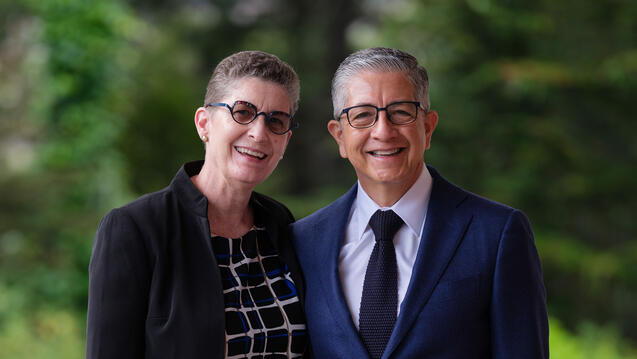Students on Campus Stay Alone Together

What’s it like to live on a college campus under a shelter-in-place order?
Ask Aditya Dixit ’21. When coronavirus hit, he couldn’t fly back to India because of travel bans, so he’s still living in Loyola Village.
Gretel Baur ’20 couldn’t go home to Portland, Oregon, because her sister has muscular dystrophy and “her immune system has always been at risk,” said Baur. Baur is staying in Toler Hall, where she works as a resident adviser.
Dixit and Baur are two of 150 students on the Hilltop who, for various reasons, have remained in residence.
Lunch at a Distance
So what’s it like on campus these days?
In observance of social distancing guidelines, each student now lives alone in a room. They still get their meals from the Market Cafe in University Center, but instead of eating in the dining hall, they take their meals away.
Baur, an environmental science major, at first found it difficult to focus on her classes, a problem students who are not living on campus are experiencing, too. “It’s hard to switch from one class to the next without the change in place and scenery, like walking from one building to another,” she said.
To cope with shelter-in-place, Baur takes refuge outdoors. “If I have to go pick something up, I'll purposely choose someplace far away and walk to it,” she said. “I've been socially distancing, but try at least to be outside a little bit. I'll set up my hammock, or just sit outside and read a book.”
Dixit, who is majoring in economics and computer science, said he's trying to stay healthy. “If I have time in the mornings, I stretch and do some basic exercises to keep my body moving. I’m trying to avoid unhealthy snacks or processed foods since I’m sitting with my computer for eight hours straight every day.”
USF Support
Dixit said that while he would like to be at home with his family, “being on campus is honestly the best option because I have a lot of support. Like when I needed to go to Target, to buy a lot of stuff at the start of the month, public safety drove me there in a minivan and brought me back. And once my internet wasn't working, and ITS came by and fixed it. We have access to all these resources and it’s very safe and connected.”
Also, he said, he’s glad that his professors hold Zoom classes that involve the whole class, instead of just recording lectures that students view alone on their own time. The online class creates a community.
As a resident adviser, Baur has been a source of support for fellow students.
“I make it a point to set up meetings with people who want to talk, because sometimes they don't have another person to tell about their day,” she said. “And that’s really just human, face-to-face on Zoom or six feet apart (in person), talking about stuff that isn’t coronavirus.”
Although the staff of Student Housing and Residential Education (SHaRE) is working remotely, they are constantly in touch with students, said Torry Brouillard-Bruce, senior director of SHaRE.
“Our staff continues to provide and share campus resources," he said. "This includes connecting students with CAPS, CASA, and other campus offices that provide support above and beyond what SHaRE staff typically provides.”


